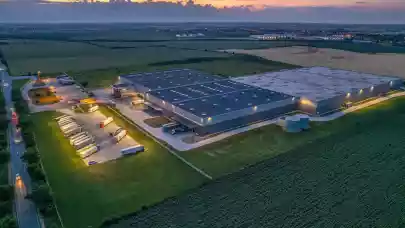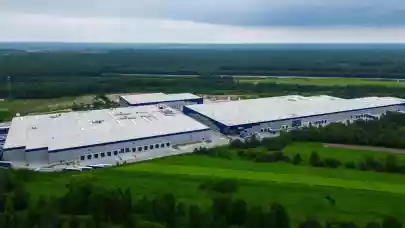
Business and leisure travel is back in CEE, including Hungary, which makes investments more profitable than it was expected a year ago. Property Forum asked Silvija Lovreta, Senior Director of South Eastern Europe - International Hotel Development at Marriott International about the extensive development pipeline and ways the company meets environmental challenges. On behalf of Marriott's local partner for the development of the first Moxy hotel in Budapest, Forestay Group, Bálint Botos also commented on a few questions.
How do you assess the current options for business travel across CEE? Has it come back or just made some steps to be on track again?
Concerns about the macroeconomic environment persist around the world, but booking trends to date remain robust and we have significant momentum in our business. Demand continued to rise across all customer segments in the first quarter of 2023, and our occupancy levels are now exceeding 2019 ones from June to August included, with higher average room rates.
It is clear that post‐pandemic, people have a deep appreciation for travel – for both leisure and business. Business meetings are coming back in healthy numbers, and we can observe an interesting trend coming with continuing flexible/ remote working patterns: people look to blend work and leisure travels more or travel for extended periods.
The CEE region is benefitting from these trends as well and we can see increased demand for countries like Poland, the Czech Republic and of course Hungary; as well as the Balkans or the Caucasus. With our portfolio and loyalty programme, the largest global room distribution, and dedicated associates, Marriott International is well-positioned for strong growth over the coming years.

Silvija Lovreta
Senior Development Director
Marriott International
What are the drivers to bring different hotel brands to Hungary?
The entire region of Central and Eastern Europe is of great importance to us. We have more than 90+ properties here offering nearly 18,000 rooms. Hungary is one of the key markets for Marriott International. With six properties currently, representing brands from the luxury segment (The Ritz-Carlton Budapest and Matild Palace, Budapest, a Luxury Collection hotel), premium (Budapest Marriott Hotel) to select service options, such as Courtyard by Marriott Budapest City Center, we can accommodate various needs of both leisure and business travellers.
I am also very pleased to see how robust our development plans are in the country. The W Hotels brand will make its debut in the region later this year. W Budapest will open this summer, followed by W Prague. In autumn also the very first Autograph Collection hotel in Hungary will open, with the Dorothea Hotel, Autograph Collection.
I am very happy that together with the Forestay Group now we are bringing the playful Moxy brand to this market with the Moxy Budapest Downtown Hotel. I believe it will fit the city’s vibe and complement the hospitality scene. Overall, six new Marriott International properties are set to open in Hungary over the next 2 years.
Bálint Botos, Forestay Group added: Budapest is very popular amongst young and young-at-heart city hoppers due to its entertainment, gastronomy and cultural heritage offer and Moxy as a brand targets exactly this type of traveller. We have always envisioned that a Moxy would be the ideal fit for this location because it perfectly matches the DNA of the 7th district neighbourhood of Budapest, however, we have considered and evaluated several brands for this project. Our review confirmed the initial idea and we are grateful that Marriott International also shares our view.
How about regional cities in Hungary? Is there enough demand to extend Marriott’s presence?
We would like to increase our presence in this market and certainly, we are interested in the regions beyond Budapest. We are looking for opportunities in the right places, with the right partners.
Bálint Botos, Forestay Group added: There are several cities of regional importance with significant business opportunities due to the development of certain industries such as automotive and battery production. Furthermore, around these centres, there are several attractive leisure tourist destinations related to thermal waters or Europe-wide popular cultural events that would make a hotel development feasible. We are constantly analysing regional markets and should an opportunity present itself, we would pursue it.
Almost all players try to get lower energy bills and manage their properties to reach ESG compliance. What is Marriott’s way to have a lower carbon footprint?
With our size and scale, we have a global responsibility and a unique opportunity to be a force for good. We both optimize our existing processes, so they are more and more sustainable, and of course when designing new property environmental stipulations are the utmost priority. We have committed to reducing our carbon footprint by 30% by 2025 (compared to 2016). In Marriott Prague, the Artisan restaurant introduced a zero-waste kitchen concept and whatever does not end up on the plate – peelings, pits, pulp, seeds, and other scraps – is reused for fermentation, receiving sauces, vinegar and many more. Sheraton Tel Aviv renewable energy usage – 90% of the hotel’s energy is supplied by a heat pump converting the heat generated by the hotel chiller to heated water.
What's your approach to new technologies, including all the opportunities AI could offer?
We are always exploring new technologies and innovations to streamline workflows, empower our associates and elevate the overall guest experience. Generative AI can empower our guests by simplifying and personalizing planning including where to go, searching and booking travel, and creating experiential itineraries that satisfy their passions. For associates, AI can potentially help them anticipate and significantly elevate the individualized level of service and informational content we provide for guests. However, our business remains high-touch by its very nature and investing in and empowering our associates to deliver excellent personal service remains a top priority. When it comes to AI, our focus is on systems and processes that can enhance the delivery of personal service, while protecting confidential information, personal data and intellectual property.



